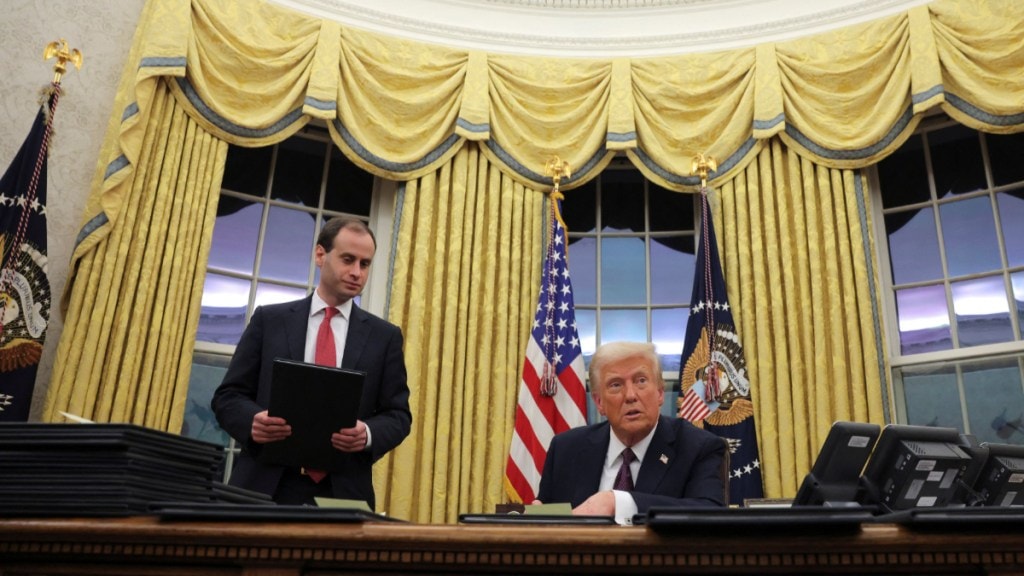Within hours of being sworn in as the 47th President of the United States, Donald Trump signed a historic number of executive orders in front of a cheering crowd. Later in the day, after arriving at the White House, he continued to sign additional orders, marking an assertive start to his second term. During his inaugural address, Trump outlined an ambitious plan for his first day back in office, announcing a series of sweeping executive actions.
25% tariffs on imports from Mexico and Canada
Trump announced on Monday evening that his administration will impose 25% tariffs on imports from Mexico and Canada on February 1, a CNN report said. The decision, revealed during a signing ceremony in the Oval Office, marks a significant shift in North American trade policy and could lead to higher prices for US consumers.
When asked about tariffs on China, Trump highlighted the tariffs he had imposed during his first term, noting that they remained in place after being largely upheld by his successor, Joe Biden.
As a candidate, Trump advocated for aggressive trade policies, including a blanket tariff of up to 20% on imports from all countries. His proposals included a 25% tariff on goods from Mexico and Canada and a 60% tax on imports from China. He also suggested using tariffs as leverage in negotiations with other nations, citing Denmark as an example. Trump had previously proposed pressuring the European country to transfer control of Greenland to the United States.
Undoing Policies of Biden Administration
Following the presidential parade, he delivered a second speech and signed 80 executive orders aimed at undoing policies implemented during the Biden administration. The flurry of orders underscored Trump’s commitment to quickly implementing his agenda and reversing his predecessor’s initiatives. Minutes before signing the orders, Trump said, “We will sign executive orders first to revoke nearly 80 destructive and radical executive actions of the previous administration.”
Pardons
President Donald Trump issued pardons to approximately 1,500 individuals involved in the January 6, 2021, Capitol riots. These individuals had been charged with attacking law enforcement officers while attempting to block the certification of Trump’s 2020 election loss. Trump stated, “We hope they come out tonight,” referring to those receiving pardons. Additionally, he commuted the sentences of six other defendants.
Border Security and Immigration
The executive orders outlined on President Trump’s first day in office prioritised declaring a national emergency at the southern border with Mexico. The plan included halting illegal crossings and initiating the process of deporting a significant number of undocumented individuals with criminal records. The orders also called for the immediate deployment of troops to secure the border.
Withdrawing from Paris Climate Agreement
Trump officially withdrew the US from the Paris Climate Agreement and repealed a 2023 Biden policy banning oil drilling across 16 million acres in the Arctic. He framed these moves as prioritising US interests over global climate goals. His administration also announced an end to leasing for wind farms and planned to halt support for electric vehicle initiatives, including subsidies and charging infrastructure.
Withdrawing from WHO
Trump announced that the United States would be withdrawing from the World Health Organization (WHO). He criticized the global health agency for its poor handling of the Covid-19 pandemic, as well as other global health emergencies.
Energy Policy
Declaring a national energy emergency, Trump announced plans to refill strategic oil reserves and prioritize the export of American energy. He described Alaska as a key player in US national security and energy independence, with a focus on expanding liquefied natural gas exports. His administration also pledged to block wind energy projects and revoke mandates promoting electric vehicles. Another order would roll back the Green Policy promoting electric vehicles (EVs), signaling a shift in the nation’s environmental strategy.
Restoring Free Speech
One of the key executive orders signed aimed to “restore freedom of speech and end federal censorship.” This move followed allegations by Trump and his supporters that the Biden administration had suppressed free expression on digital platforms.
The previous administration was accused of undermining free speech by pressuring social media companies to moderate or remove content that did not align with federal approval, the White House said. This coercive approach, they argued, infringed on Americans’ rights to express themselves freely online.
Diversity and Transgender Rights
Trump will slash diversity, equity, and inclusion (DEI) programs. He declared that the federal government would only recognise two sexes — male and female. Further measures included ending transgender rights in the military and schools, with more actions targeting DEI programs anticipated in the coming days.
Renaming the Gulf of Mexico
Donald Trump announced that his first day in office would include signing orders to rename the Gulf of Mexico as the Gulf of America.
Inflation Relief
Trump instructed federal agencies to deliver immediate measures to combat inflation and reduce costs for Americans. The orders emphasized cutting regulations and climate policies seen as burdensome while promoting actions to expand the housing supply and lower housing costs. “The Biden Administration’s destructive policies caused a historic inflation crisis,” the order stated.
Regulatory and Hiring Freezes
Trump implemented orders freezing both federal government hiring and new regulations. Another directive required federal employees to return to full-time, in-person work, reversing remote work policies that had expanded during the COVID-19 pandemic. Trump claimed this would halt excessive government regulation and ensure federal hires were “competent and faithful to the American public.”
TikTok Ban
Trump paused a planned ban on TikTok in the U.S., giving the app and its Chinese parent company, ByteDance Ltd., an additional 75 days to negotiate a deal addressing ongoing national security concerns.
OECD Tax Deal
Trump signed an executive order stating that the global minimum corporate tax agreement, supported by the Biden administration and negotiated with over 100 countries, would have no legal effect in the U.S. unless approved by Congress.
(With AP Inputs)

